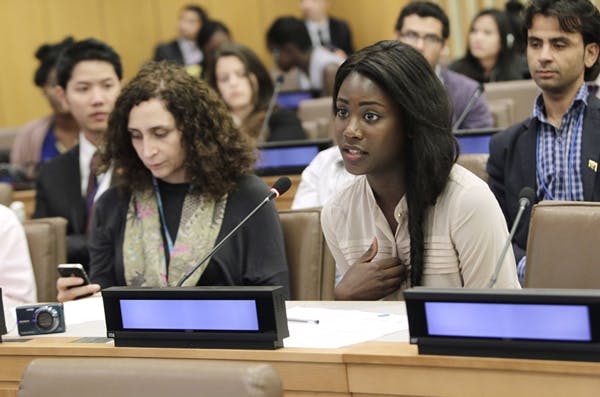Hello! I am excited to serve as the 2014-2015 U.S. Youth Observer to the United Nations. I hope to elevate youths’ voices to the attention of regional, national, and international policymakers worldwide.
“Millennials” account for more than 50% of the world’s population (i.e., one in two people globally is under the age of 30!). We are arguably the most interconnected generation in history and offer the world a nearly inexhaustible resource of energy, enthusiasm, ideas, and intellectual capital.
Technology is our domain and increasingly serves to affect change irrespective of spatial and continental barriers (the world is indeed flat). Since the first email in 1971, the significance of digital media has increased from novelty to necessity to revolutionary – the 2011 Egyptian revolution marched to the sound of Tweets, not timpani; refugees separated by conflict can now access UN databases to relocate loved ones; and you are reading this via an internet connection.
As the deadline of the United Nations Millennium Development Goals (MDGs) approaches, we have witnessed the increased use of technology and social media to mobilize populations worldwide to act and carry out initiatives of the United Nations. This year I hope to continue forward with similar efforts using Facebook, Twitter, our GenUN initiative, and other digital media.
The MDGs are a springboard to understand the inter-relatedness of many of the issues currently facing global citizenry. Poverty forces children away from school in order to supplement a family’s income, often limiting their own educational attainment. Lower educational attainment decreases earning potential, causing cyclical poverty. Global climate change shifts the altitudinal and latitudinal limits of diseases and their corresponding vectors (such as malaria and the Anopheles mosquito), leading to disease outbreaks in regions that have never battled them before. Social stigma from HIV and AIDS impedes individuals from seeking treatment, risking additional disease transmission as well as economic losses due to a weakened workforce. Everything is connected. Inequality affects opportunity which affects economy which affects . . . everything.
As shown by Brooke’s and Tiffany’s updates throughout the past two years, global leaders are interested in what youth can bring to policy debates. Global leaders want our opinions and input when making decisions that will affect the next generation. We – as globally connected citizenry – have the motive, means and opportunity to share our opinions and concerns about the world.
Be on the lookout for updates via Twitter, Facebook, and the GenUN site throughout the year regarding U.N. policies and avenues to get involved! I am excited to work towards shaping a more inclusive, representative, and just world in the age of digital media and the Millennial generation. Get ready to be inspired and take action!
Hello! I am excited to serve as the 2014-2015 U.S. Youth Observer to the United Nations. I hope to elevate youths’ voices to the attention of regional, national, and international policymakers worldwide.
“Millennials” account for more than 50% of the world’s population (i.e., one in two people globally is under the age of 30!). We are arguably the most interconnected generation in history and offer the world a nearly inexhaustible resource of energy, enthusiasm, ideas, and intellectual capital.
Technology is our domain and increasingly serves to affect change irrespective of spatial and continental barriers (the world is indeed flat). Since the first email in 1971, the significance of digital media has increased from novelty to necessity to revolutionary – the 2011 Egyptian revolution marched to the sound of Tweets, not timpani; refugees separated by conflict can now access UN databases to relocate loved ones; and you are reading this via an internet connection.



 View All Blog Posts
View All Blog Posts